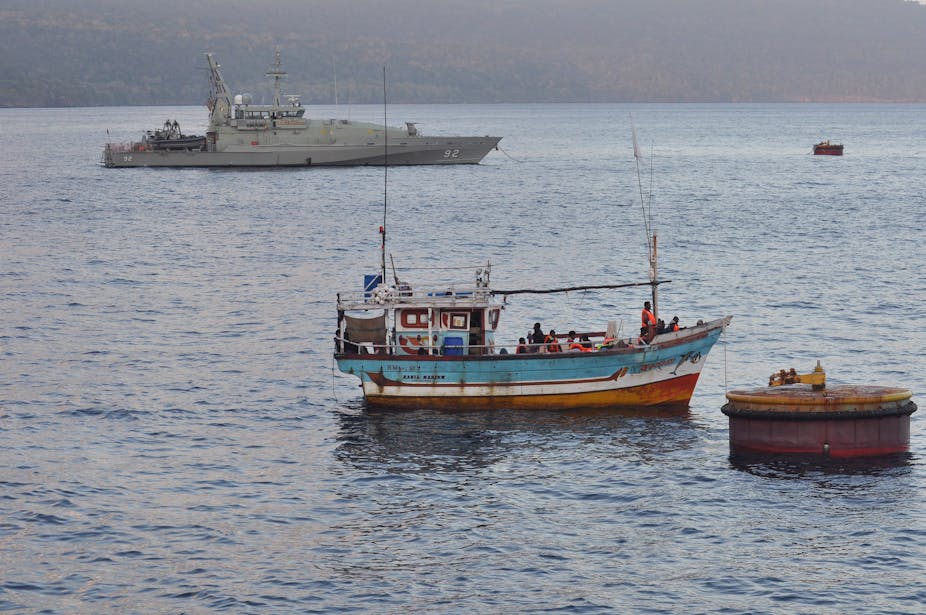The most recent IPCC report included a chapter on security – the first time this has happened. The report pointed to a range of security threats associated with climate change, including ill-health, food shortages and natural disasters; and increased conflict, displacement and migration.
But it noted that the world, including Australia, is ill-prepared for those threats.
Growing concern
The new security focus for the the IPCC reflects growing interest in climate change and security in the academic and policy worlds. A number of states (from the USA to Germany, Australia and the UK) have now included climate change in national security statements or strategies.
Policy-oriented think tanks have also outlined how climate change multiplies threats — triggering unrest and complicating national security planning.
At the international level, the UN Development Program, like the IPCC report, has focused on the human security effects of climate change. And the UN Environment Program and the Secretary-General have linked climate change to international instability.
This was the focus too of UN Security Council discussions on climate change in 2007 and 2011.
What the latest IPCC report says
In the IPCC report, the emphasis is on the nature of current and future (human) security threats associated with climate change.
In particular, the summary for policy-makers and the chapter on “human security” explicitly state that the world is currently not prepared to deal with the security risks associated with a warming world. The authors stated that there is “‘strong evidence’ that climate-related threats to human security are getting "progressively worse”.
According to the report, we are already seeing water and food insecurity, with all aspects of food insecurity set to worsen.
Other “threats” outlined in the report include an increased likelihood of conflict, higher levels of population movement and displacement and damage to infrastructure.
The report suggests that states will need to ensure that these threats are reflected in national security strategies.
Security threats to Australia
From Australia’s perspective, vulnerable Australian populations are clearly threatened at the level of human security. This threat will be direct in the form of sea-level rises, health effects and natural disasters.
But there will also be acute indirect threats in economic terms, through declining agricultural yields, threats to the tourism industry and the costs of natural disasters.
Of the more traditional security threats linked to climate change — contribution to conflict and the destabilising effects of population movements — the latter will be most relevant to Australia. This reflects its geographical location and the likelihood of displacement for populations of low-lying island states in the Pacific.
Australia’s response?
The current Australian Government’s concerns about the “unauthorised arrival” of asylum-seekers should suggest a national commitment to strong action on climate change. After all, climate change is expected to increase displacement as a result of impacts such as sea level rise.
It should also suggest a strong financial commitment to aiding states in the region to adapt to impacts of climate change effectively. Yet these are precisely the policies the current government is walking away from.
The worst case scenario, from the perspective of those hoping to see a progressive approach to the security effects of climate change from the current Australian government, is barely worth contemplating. It would be an adaptation response that attempts to ensure “climate refugees” are more efficiently prevented from reaching Australia’s shores.
While clearly a perverse response to the security effects of climate change, it is not inconceivable. It is a scenario consistent with Australia’s current asylum policy and even existing accounts of state responses to climate change from a national security perspective.
A 2003 report for the Pentagon argued that self-sufficient states might undertake precisely such defensive measures in responding to climate refugees.
Wake-up call
The IPCC’s chair, Rajenda Pachauri, argued that this report should “jolt” states and their political leaders into action. Will the language of security help in this sense? Some theorists of security in international relations suggest that security is a powerful “speech act”, enabling emergency measures to deal with issues agreed to be security threats.
Yet on the ground, the precedents aren’t promising. Kevin Rudd’s attempts to link climate change and security coincided with a steady drop in public support for climate change action in Australia. And neither UN Security Council debates nor statements by the Secretary-General have been enough to propel concerted climate action at the international level.
The IPCC report is measured and convincing on the human security implications of climate change, pointing to the exposure of the most vulnerable to climate-related threats for which they are least responsible.
Will the language of security help people and their leaders in those states that are most responsible and have the greatest capacity to act to take climate change seriously? That’s not clear.
But it certainly should.

